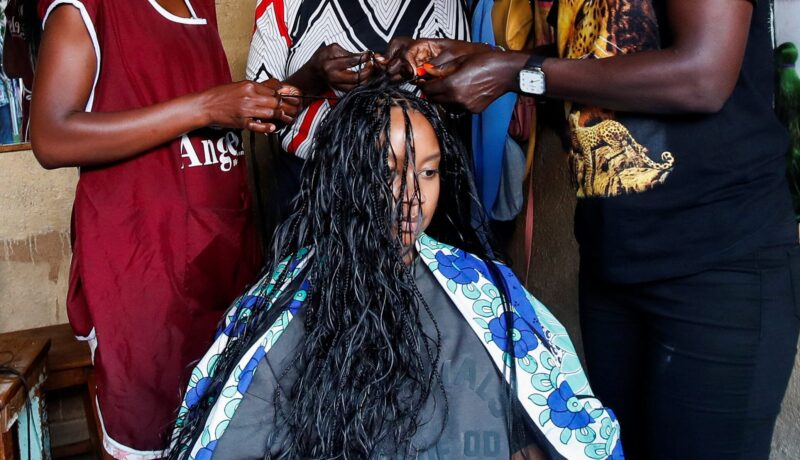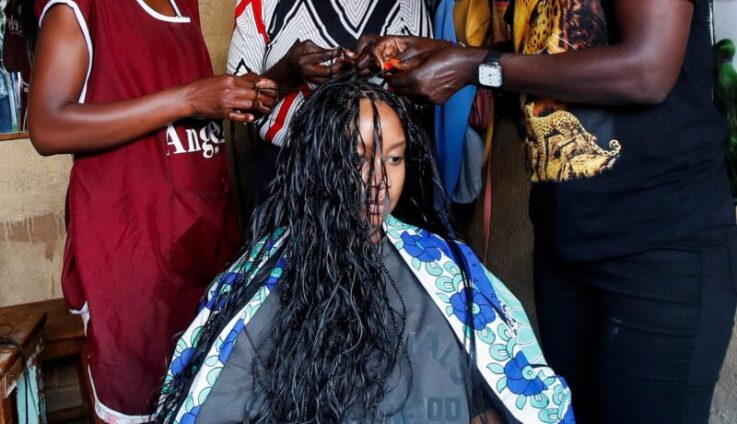Kenyan hair braider Jemima Atieno spent decades building her business in Nairobi's bustling Kenyatta market, only to lose ground to social media after the pandemic as her customers went online to find similar services.
"I don't know how somebody can get to social media," the 52-year-old told Reuters, reflecting a gender divide that has seen Kenyan men reap benefits from the country's expanding online gig economy while women have been left behind.

But her business received a boost when she discovered "Braiding Nairobi," an app where users can order braiding services directly to their home, similar to what Uber, Glovo and other digital platforms have done for food and grocery deliveries.
Founder Natachi Onwuamaegbu, 25, told Reuters she launched the app in May after interviewing braiders at Kenyatta market, home to hundreds of salons, for a storytelling project.
Braiders told Onwuamaegbu their business went up after she published their stories on Instagram and an online blog.
She realized she could create an even playing field "where you don't have to be super proficient in Instagram and social media to be able to gain access to a wider web of customers."

Kenyan women have less reliable internet access than men, and lower education levels translate to fewer digital literacy skills, according to a 2023 International Labour Organisation report.
Only 28% of gig workers in Kenya are female, and a majority are under 25, according to a 2023 study supported by the Alexander Von Humboldt Institute for Internet and Society.
Some braiders don't have reliable data or are not comfortable using the app, so Onwuamaegbu calls them directly to confirm orders.
So far, 180 customers and around 100 hair braiders have signed up, with more on the waitlist as Onwuamaegbu seeks to expand the app slowly.
Experts warn that Kenya lacks laws to regulate the gig economy.

"There needs to be in place some sort of policies to ensure some security for the gig workers," said researcher Kutoma Wakunuma. "But these policies are slow in the making."
But braiders told Reuters the economic benefits outweigh the risks.
"In this app, everything is convenient -- the prices, the style, the client needs," said Esther Mulandi, deftly weaving a customer's braids. "For me, it's working and growing very fast."
Latest Stories
-
Ghana Football Awards 2025: Mary Berko, 3 others nominated for Home-based Footballer of the Year
48 seconds -
Ghana Football Awards 2025: Police Ladies, Oaks Ladies and 2 others vie for Female Team of the Year
30 minutes -
Fuel prices drop across Ghana as projected – ASEC
32 minutes -
Wontumi’s detention: I have blocked Appiah-Kubi; I won’t talk to him again – Gary Nimako
39 minutes -
Ghana Football Awards: Salah, Hakimi, Guirassy nominated for best African international
44 minutes -
“Ofori-Atta sat by indolently” – Special Prosecutor slams ex-minister for withholding medical updates
57 minutes -
Special Prosecutor must clearly explain why Ofori-Atta must appear in person – Martin Kpebu
1 hour -
Dr Charity Binka rallies journalists to highlight the silent epidemic of lifestyle-induced deaths
1 hour -
Akatsi South Assembly launches major sanitation drive to restore market hygiene and boost local economy
1 hour -
‘Tekyerema Pa Hackathon’ advances Ghana’s 1 Million Coders agenda with AI solutions for speech disabilities
1 hour -
AMA to mark 10th anniversary of June 3rd disaster with climate summit and citywide clean-up
2 hours -
OSP’s full statement on Ken Ofori-Atta, Cecilia Dapaah, and 2 other high-profile cases
2 hours -
Chairman Wontumi released by EOCO after meeting bail conditions
2 hours -
Ghana Football Awards: Kwesi Appiah, Frimpong Manso, & 2 others nominated for Coach of The Year
2 hours -
Tensions flare at EOCO as supporters demand Wontumi’s release
2 hours

